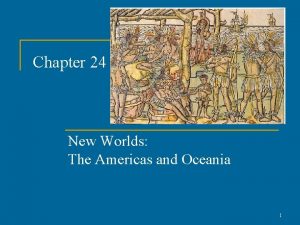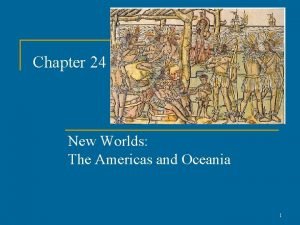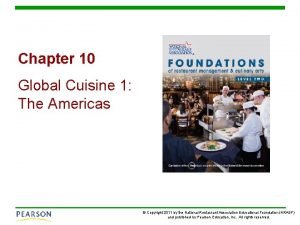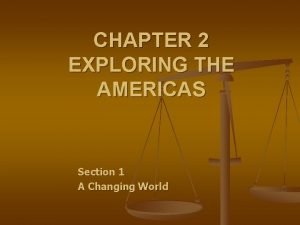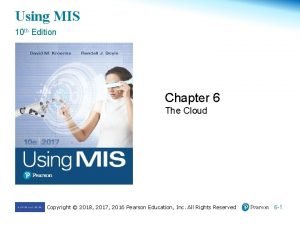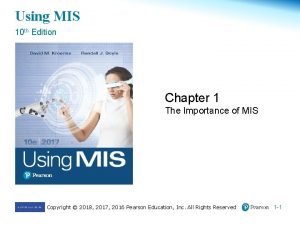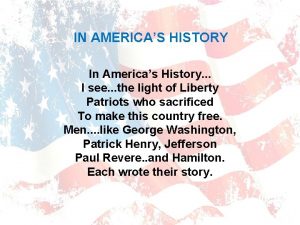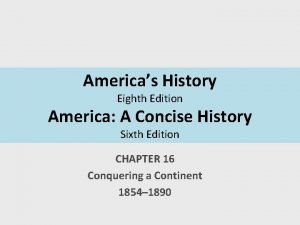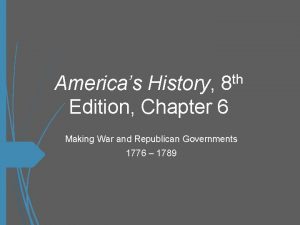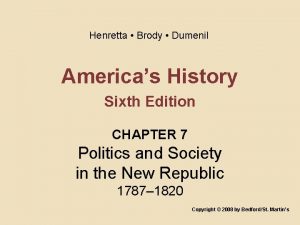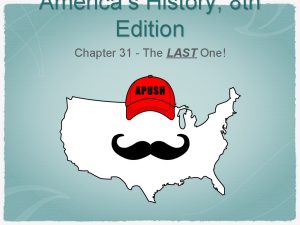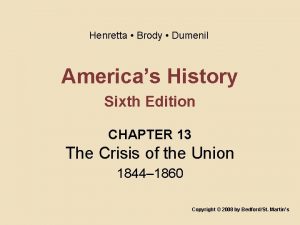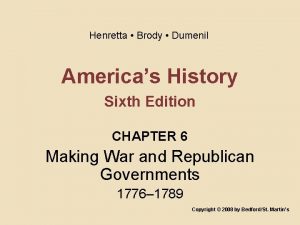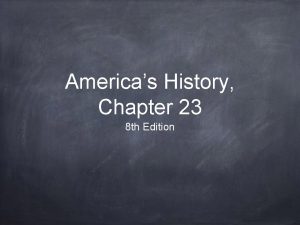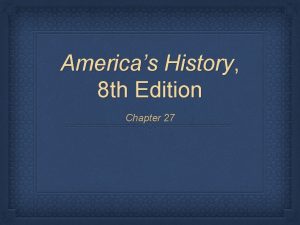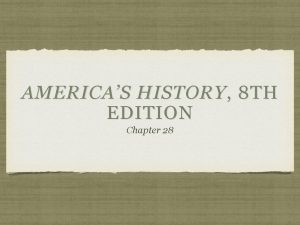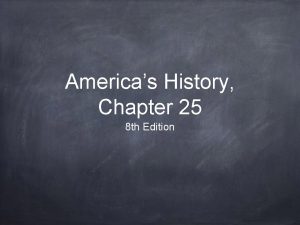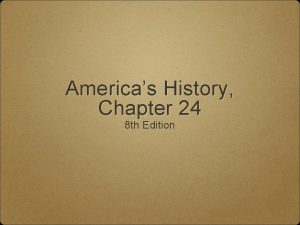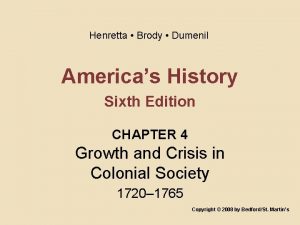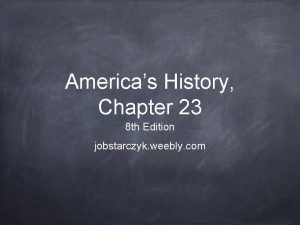AMERICAS HISTORY 8 TH EDITION Chapter 28 Shout



















- Slides: 19

AMERICA’S HISTORY , 8 TH EDITION Chapter 28 Shout Out to Mr. Irish’s Class in TX!!

LIBERALISM AT HIGH TIDE Great Society: Focus on domestic programs including: civil rights, poverty, and education Built on ideas and programs laid forth from The New Deal John F. Kennedy’s Promise: Kennedy proposed health insurance for the elderly, antipoverty, tax cuts, and a civil rights bill. JFK helped demonstrate the power of image Lyndon B. Johnson and the Great Society: LBJ became president on 11/22/63, sought to end poverty 20% lived in poverty, much higher for African Americans and Natives Economic Opportunity Act - Head Start (free early childhood education for poor students); Job Corps and Upward Bound - training and employment; Volunteers in Service to America (VISTA) - domestic peace corps

LIBERALISM AT HIGH TIDE, CONTINUED The 1964 Election: (Check out my video) LBJ v. Barry Goldwater (R, AZ) Goldwater opposed Great Society programs and advocated a tougher Cold War stance Ronal Reagan’s “A Time for Choosing” - supported Goldwater at the 1964 Republican convention Great Society Initiatives: Elementary and Secondary Education Act - $1 billion in federal money Medicare - health insurance for elderly Medicaid - health insurance for lower income individuals and families Housing and Urban Development - newly created department, built public housing Immigration Act of 1965 - reversed the discriminatory quota acts of the 1920 s Allowed relatives of legal immigrants to be admitted regardless of numerical limits; especially favored Asian and Latin American immigrants

LIBERALISM AT HIGH TIDE, CONTINUED Assessing the Great Society Health care for poor and elderly increased Poverty rate for African Americans decreased Poverty and segregation remained in many areas Rebirth of the Women’s Movement Labor Feminists 1960 s women sought equal pay for equal work and maternity leave 1963 Equal Pay Act - equal pay for equal work 1970 s - more women worked outside the home

LIBERALISM AT HIGH TIDE, CONTINUED Betty Friedan and the National Organization for Women (NOW) The Feminine Mystique - Betty Friedan Argued that many housewives in suburbs were not happy and lived unfulfilled lives Birth Control Pill - led to the decline in birthrates, end of the baby boom generation National Organization for Women (NOW) Modeled after the NAACP, is a civil rights organization for women Helped bring attention to lack of women in certain professions and politics

THE VIETNAM WAR BEGINS Kennedy did not want to loose credibility by withdrawing from Vietnam Escalation Under Johnson “I’m not going to be the President who saw Southeast Asia go the way China went” Gulf of Tonkin In August, 1964, there was a report that a US ship was attacked in international waters by the North Vietnamese; gave LBJ a reason to escalate the war Gulf of Tonkin Resolution: Congress gave LBJ the ability to use any measures necessary in Vietnam Essentially, it gave LBJ a “blank check”

THE VIETNAM WAR BEGINS The New American Presence Operation Rolling Thunder: Bombing campaign against North Vietnam in 1965 More bombs were dropped on Vietnam than Europe and Asia during WWII The North Vietnamese continued to resist and increased their morale Vietnam taught the US that superior technology and weapons does not always win a war

THE VIETNAM WAR BEGINS Public Opinion and the War “Credibility gap” - writers began to expose that the realities of the war were different than what the administration portrayed Rise of the Student Movement Students for a Democratic Society (SDS) - founded in Michigan by students that sought social change Port Huron Statement - criticized the gap between the rich and poor, as well as the nation’s consumer culture The New Left: Different than the Old Left - associated with Communism Focused on gay rights, gender issues, and abortion UC Berkeley - Free Speech Movement - students sought to use universities and public spaces for protests and organizations Selective Service - Draft - 1967 - banned automatic student deferments -> increased protests

THE VIETNAM WAR BEGINS Young Americans for Freedom (YAF) - conservative response to the New Left “The Sharon Statement” written before the Port Huron Statement, inspired many conservatives The Counterculture (New curriculum) “Hippies” Inspired by folk music, later the Beatles, Rolling Stones, etc. Rejected many values of their parents’ generation Used drugs - marijuana and LSD Helped introduce a sexual revolution

DAYS OF RAGE, 1968 - 1972 War Abroad, Tragedy at Home The Tet Offensive January 30, 1968 - Vietnamese New Year Surprise attack by the North on the South Although the North was defeated, it was a watershed event in the war Many began to see the war as un-winnable, protests increased drastically Political Assassinations 1968 - the year of “shocks” Tet Offensive April 4, 1968 - MLK Jr. was assassinated in Tennessee - led to riots in many cities June 5, 1968 - RFK was killed in the midst of the Democratic Primary

DAYS OF RAGE, 1968 - 1972 The Antiwar Movement and the 1968 Election Democratic Convention Chicago, 1968 - demonstrations outside the convention were broken up by police with clubs and tear gas Richard Nixon focused on northern working class workers and southern whites George Wallace Advocated “law and order” Ran as a third party candidate on a segregationist platform Nixon’s Strategy “Southern strategy” - sought to gain the support of whites in the south Outspoken against “the antiwar movement, urban riots, and protests” (923) With the election of 1968, white southerners began to abandon the Democratic Party

DAYS OF RAGE, 1968 - 1972 The Nationalist Turn Chicano Moratorium Committee - Mexican Americans protesting the Vietnam War Argued that the draft hurt the poor Women’s Liberation Feminists tended to by younger, educated, and associated with the civil rights and antiwar movements Some radical women sought to gain feminist goals through politics Sexual politics - advocated that women must have control over their bodies in order to shape their destinies Focused on access to abortion and awareness for sexual assault and sexual harassment Title IX (1972): Banned discrimination in higher education based on sex; federal funds would be cut off Gloria Steinem - helped create the National Women’s Political Caucus Helped sponsor legislation promoting equal rights 1974 - Equal Credit Opportunity Act - allowed married women to get credit cards in their own names

DAYS OF RAGE, 1968 - 1972 Stonewall and Gay Liberation Homosexuality remained illegal in many states Stonewall Inn - gay bar in NYC that was raided by police Led to riots over a two day period Birth of the Modern Gay Rights Movement

RICHARD NIXON AND THE POLITICS OF THE SILENT MAJORITY Silent Majority - Nixon’s belief that many Americans supported his beliefs and the war Nixon in Vietnam “Peace with Honor” - Nixon sought to end the Vietnam War, but only in a way satisfactory to the US Vietnamization and Cambodia Vietnamization - gradual withdrawal of US troops from Vietnam, by being replaced with South Vietnamese troops April, 1970 - US began bombing supply lines and bases in neighboring, neutral Cambodia This led to many protests on college campuses, most notably, Kent State My Lai Massacre Execution of over 500 South Vietnamese women and children

RICHARD NIXON AND THE POLITICS OF THE SILENT MAJORITY Detente (New Curriculum) Easing of Cold War tensions between the US and Soviet Union Strategic Arms Limitation Treaty (SALT I) - signed by Nixon and Brezhnev February 21, 1972 visit to China Nixon sought to gain an advantage over the Soviet Union and help end the Vietnam War Exit America Election of 1972 - Nixon campaigned on “Peace at hand” January 1973 - Paris Peace Accords 58, 000 + Americans died, 300, 000 wounded

RICHARD NIXON AND THE POLITICS OF THE SILENT MAJORITY The Silent Majority Speaks Out Law and Order and the Supreme Court Warren Court - 1954 - 1969 Accused of “legislating from the bench”, rights of the accused increased Miranda v. Arizona - People must be made aware of the right to remain silent (5 th amendment) Sanctioned religious practices in public schools were prohibited Busing In the 1950 s, schools were ordered to desegregate with “all deliberate speed” As of 1968, 1/3 of southern blacks attended integrated schools Mid-1970 s 86% attended integrated schools Busing was used by the courts to decrease segregation The growth of suburbs helped increase segregation in the North

RICHARD NIXON AND THE POLITICS OF THE SILENT MAJORITY The 1972 Election Many southern whites switched to the Republican Party Nixon v. George Mc. Govern (D, ND) Nixon won in a landslide

QUICK RECAP Great Society Immigration Act of 1965 Betty Friedan and NOW Gulf of Tonkin Resolution Counterculture Tet Offensive -> increase in domestic protests 1968 “shocks” - Tet Offensive, MLK, RFK, Democratic Convention Title IX Stonewall Riots Vietnamization Detente Warren Court

SEE YOU BACK HERE FOR CHAPTER 29! Thanks for watching! Subscribe and share Check out other videos in the description (End of year reviews) Good luck in May!
 Ap world history chapter 20 the americas and oceania
Ap world history chapter 20 the americas and oceania Ib history exams
Ib history exams Chapter 24 new worlds the americas and oceania
Chapter 24 new worlds the americas and oceania Chapter 24 new worlds the americas and oceania
Chapter 24 new worlds the americas and oceania Chapter 24 new worlds the americas and oceania
Chapter 24 new worlds the americas and oceania Chapter 10 global cuisine 1 the americas
Chapter 10 global cuisine 1 the americas Chapter 2 exploring the americas study guide
Chapter 2 exploring the americas study guide What did amerigo vespucci explore
What did amerigo vespucci explore Chapter 16 people and empires in the americas
Chapter 16 people and empires in the americas Mis chapter 6
Mis chapter 6 Using mis 10th edition
Using mis 10th edition Https://slidetodoc.com/psalm-100-1-shout-for-joy-to-the/
Https://slidetodoc.com/psalm-100-1-shout-for-joy-to-the/ Https://slidetodoc.com/psalm-100-1-shout-for-joy-to-the/
Https://slidetodoc.com/psalm-100-1-shout-for-joy-to-the/ Https://slidetodoc.com/psalm-100-1-shout-for-joy-to-the/
Https://slidetodoc.com/psalm-100-1-shout-for-joy-to-the/ Https://slidetodoc.com/psalm-100-1-shout-for-joy-to-the/
Https://slidetodoc.com/psalm-100-1-shout-for-joy-to-the/ Https://slidetodoc.com/psalm-100-1-shout-for-joy-to-the/
Https://slidetodoc.com/psalm-100-1-shout-for-joy-to-the/ Https://slidetodoc.com/psalm-100-1-shout-for-joy-to-the/
Https://slidetodoc.com/psalm-100-1-shout-for-joy-to-the/ Tedx simon sinek
Tedx simon sinek Who wrote psalm 150
Who wrote psalm 150 Verb ke 2 cook
Verb ke 2 cook


